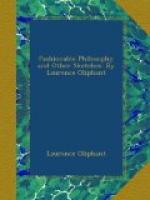Germsell. He says so himself, and he ought to know. His whole system of philosophy is nothing more nor less than the result of the liberation of certain forces produced by chemical action in the brain.
Drygull. Then, if I understand you rightly, if the chemical changes which have been taking place for some years past in his brain had liberated a different set of forces, we should have had altogether a different philosophy.
Germsell. The chemical changes would in that case have been different.
Drygull. But the changes must be produced by forces acting on them.
Germsell. Exactly: a force which has its source in the Unknowable produces a certain chemical action in the brain by which it becomes converted into thought or emotion, into love or philosophy, into art or religion, as the case may be: what the nature of that love or philosophy, or art or religion, may be, must depend entirely on the nature of the chemical change.
Lord Fondleton [aside to Mrs Gloring]. I feel the most delightful chemical changes taking place now in my brain, dear Mrs Gloring. May I explain to you the exquisite nature of the forces that are being liberated, and which produce emotions of the most tender character.
Lady Fritterly [sharply]. What are you saying, Lord Fondleton?
Lord Fondleton. Ahem—I was saying—ahem—I was saying that we shall be having some Yankee inventing steam thinking-mills and galvanic loving-batteries soon. What a lot of wear and tear it would save! I should go about covered with a number of electric love-wires for the force to play upon.
Fussle. I think this matter wants clearing up, Mr Germsell. Why don’t you write a book on mental and emotional physics?
Mr Rollestone. I would venture with great diffidence to remark that the confusion seems to me to arise from the limit we attach to the meaning of the word employed. It may be quite true that no idea or emotion can exist except as the result of physical force; but it is also true that its effect must be conditioned on the quality of the force. There is as wide a difference between the physical forces operant in the brain, and which give rise to ideas, and those which move a steam-engine, as there is between mind and matter as popularly defined. Both, as Mr Germsell will admit, are conditioned manifestations of force; but the one contains a vital element in its dynamism which the other does not. You may apply as much physical force by means of a galvanic battery to a dead brain as you please, but you can’t strike an idea out of it; and this vital force, while it is “conditioned force,” like light and heat, differs in its mode of manifestation from every other manifestation of force, even more than they do from each other, in that it possesses a potency inherent to it, which they have not, and this potency it is which creates emotion and generates ideas. The fallacy which underlies the whole of this system of philosophy is contained in the assumption that there is only one description of physical force in nature.




